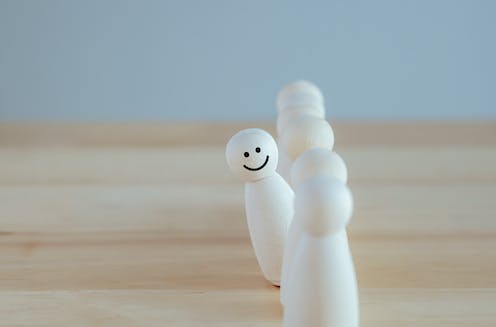
Youth mental health has worsened significantly over the past decade, but new interventions that teach positive psychology concepts in school may help.
American young people are reporting historically high levels of hopelessness, sadness and loneliness. According to the most recent data from the U.S. Centers for Disease Control and Prevention, more than 20% of adolescents have seriously considered suicide – and suicide is the second-leading cause of death for children ages 10-14.
Perhaps even more alarming than the prevalence of youth mental health problems is the inaccessibility of mental health support for the many children who need it. About 60% of depressed adolescents do not receive any treatment – and around 950,000 children do not have health insurance that covers mental health services.
One solution is to provide mental health care in schools, where kids are. This is already happening. School counselors, psychologists and social workers provide support, teach coping strategies and work with caregivers to help students overcome mental health challenges. Such vital care is essential, but clearly more help is needed.
Research shows that students who have a positive outlook regarding their lives outperform other students academically and emotionally. You might wonder, can positive thinking be taught?
I study school-based positive psychology interventions. My colleagues have found that students who’ve been introduced to science-based ideas about happiness feel more satisfied with life, experience more positive than negative emotions and have fewer emotional and behavioral problems.
Table of Contents
Science of happiness
Psychologists began to study the science of happiness in the late 1990s. Prior to that time, most psychology researchers studied misery.
Psychologist Martin Seligman was such a scientist, having pioneered the concept of “learned helplessness.” But a conversation with his young daughter, in which she demanded to know why he couldn’t “stop being such a grouch,” inspired him to start studying what makes people happy instead.
Initial studies were conceptual in nature. But before long, researchers started to identify what makes people happy, the benefits of happiness and interventions to improve happiness.
Scientists identified three main predictors of happiness – genetics, life circumstances and purposeful activities – and potentially others, depending on one’s culture. Of the big three, the first two are often out of an individual’s control. But science has shown that people can adopt strategies to feel happier.
Achieving a state of flourishing – or feeling good and doing good – is the goal of positive psychology interventions. It can evoke positive feelings, increase engagement with life, strengthen positive relationships, move people toward purpose and help people achieve meaningful goals.
Positive psychology in schools
Positive psychology is now taught in some schools around the world, including in the U.S., Australia, Denmark, Israel, New Zealand, China and South Africa. Most interventions educate students about mindfulness and positive psychology concepts such as gratitude, kindness, optimistic thinking, utilizing character strengths and hope. The idea is not just to teach students about positive psychology as a school subject but help them practice the skills that research suggests will help them flourish.
In typical programs, students first learn positive psychology concepts, then practice using them in real life with the help of trusted adults. For example, students discuss what gratitude means to them, then practice writing down three things they are thankful for every night before bed with the help of their caregivers. After a week, students discuss with adults at school how practicing gratitude affected their level of happiness.
A 2020 review of 57 school-based positive psychology programs showed more than half resulted in positive outcomes, including less stress, lower depression, less anxiety, fewer behavioral issues, better self-image, higher life satisfaction and stronger social functioning.
‘Nice inside’
One intervention currently being studied by the U.S. Department of Education is a 10-week, small-group intervention aimed at helping middle schoolers. I coach the mental health providers implementing this program.
Like other programs of its kind, it teaches youth about positive concepts, including gratitude, kindness, character strengths, optimism and hope. Early findings, presented at the 2023 National Association of School Psychology conference, show the program is being well received both by students and providers.
We’ve found students tend to favor activities that fit with their culture or values. For example, one student shared that performing acts of kindness was their favorite program-based activity, because it helped them spend more time with family and pets – the two most important things in their life. Another student said being able to share the strategies with their mother helped them both feel happier. This student was also proud to be able to help their family.
We also found that some students believed the program helped them build positive relationships with others. One student shared, “It’s really fun to see how others react when I’m being nice, such as giving a compliment,” and that doing so helped them feel “nice inside.” Another student agreed, saying making others feel good helped them feel happier.
Positive psychology training is only one piece of the solution for improving youth mental health. Children with severe issues need comprehensive treatment, which can include mental health counseling and medication.
Even though many important factors are out of a person’s control, everyone has room for growth in happiness. My colleagues and I hope teaching positive psychology in schools will become a common practice in the future.
![]()
I was a post-doctoral research fellow under Dr. Shannon Suldo (author of the Well-Being Promotion Program; WBPP). Currently, I am contracted to coach school mental health providers who are providing the WBPP through an IES-funded grant.
























